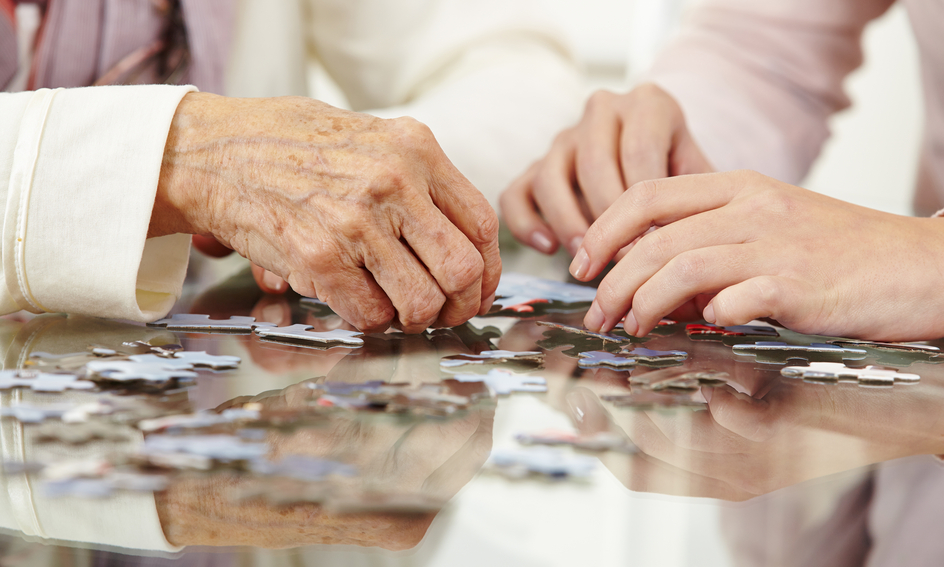What is dementia? Instead of a specific disease, dementia is an umbrella term for symptoms caused by disorders affecting the brain. According to the World Health Organization, dementia is associated with a decline in function—from memory loss to difficulty thinking, problem-solving or communicating—that’s severe enough to impair a person’s ability to perform everyday activities. Although most people who live with dementia are older adults, it is not a normal part of healthy aging. There’s no cure for dementia: a person’s symptoms will get worse as more brain cells are damaged. And while there is no cure for the disease process itself, at Amica we believe that through cognitive rehabilitation, theories of neuroplasticity and strategies and support from trained and compassionate staff, we help manage the symptoms to delay the functional decline. Most of us probably know someone affected: currently, an estimated 564,000 Canadians live with dementia; in 15 years, that number is expected to reach 937,000.

Many diseases can cause dementia. Some treatable conditions (vitamin deficiencies, sleep disorders, mental illness, etc.) may produce symptoms that mimic dementia, so it’s important to get a full medical assessment and diagnosis for yourself or your loved one. It’s also important to note that symptoms may vary from person to person, even if two people have the same diagnosis. Read on to get a general overview of four of the most common forms of dementia, including Alzheimer’s disease, vascular dementia, Lewy body dementia and frontotemporal dementia.
Alzheimer’s Disease
Alzheimer’s is the most common form of dementia. Over time, deposits of protein can clump or become tangled, interfering with healthy brain processes and ultimately causing brain cells to die. People with Alzheimer’s may experience symptoms including memory loss and changes in their physical abilities (coordination, mobility), cognitive abilities (memory, judgment, reasoning), behaviour and emotions. Once a person with Alzheimer’s experiences a decline in their abilities, we provide support to help residents manage their symptoms. Let’s say, for example, that a resident has trouble remembering to take their medicine. We can set timers, use calendars and teach them to respond to the timer by reading their calendar, which tells them what to do— suddenly meds are not forgotten. “So while we may not have changed the disease process, from a ‘functional’ perspective we have managed or improved the symptom,” says Dr. Heather Palmer, Amica’s National Director, Cognitive Well-Being.Vascular Dementia
Conditions that create inadequate blood flow to the brain can cause vascular dementia (VaD). This is because brain cells are prevented from getting essential oxygen and nutrients, causing them to subsequently die. VaD may occur suddenly following a stroke that blocked major brain blood vessels and can lead to a decline in cognitive abilities (such as confusion, speech/comprehension problems, vision loss, impaired planning/judgment, etc.). TIAs (transient ischemic attacks, which are like mini strokes that cause a temporary blockage), can have a similar effect. Symptoms may begin mildly and worsen over time due to the damage caused by multiple minor strokes or other conditions that affect smaller blood vessels. Some experts prefer the term vascular cognitive impairment (VCI) to emphasize the impact this type of dementia has on multiple areas of cognitive function (depending on where the stroke or TIAs are occurring).
Dementia with Lewy Bodies
In people with Lewy body dementia, the brain’s nerve cells have abnormal deposits of a protein that interrupts the brain’s messages. Named Lewy bodies, after the scientist who discovered them, these deposits damage brain cells over time, leading to a decline in a person’s thinking, reasoning and independent function. We don’t yet know why Lewy bodies form. Dementia with Lewy bodies can occur alone or in combination with Alzheimer’s or Parkinson’s disease. People with the disease may experience symptoms including varying degrees of confusion and alertness, a progressive loss of memory, language, difficulty interpreting visual information, visual hallucinations or delusions as well as sleep disturbances. Symptoms might also affect a person’s mobility: hunched posture, rigid muscles, tremors and shuffling movements. (Parkinson’s disease dementia is another type of dementia that can affect the cognitive function of people diagnosed with Parkinson’s disease.)
Frontotemporal Dementia
Frontotemporal may appear in younger people than those typically affected by Alzheimer’s disease. Unlike Alzheimer’s, which can affect most areas of the brain, frontotemporal dementia primarily impacts the frontal and temporal lobes of the brain—areas generally associated with a person’s personality and behaviour. Brain changes vary: sometimes, brain cells in affected areas shrink and die; in other cases, they enlarge. Symptoms may include changes in personality or behaviour (such as losing the ability to restrain one’s actions, changes in food preferences, changes in energy/motivation), problems with speech/language, confusion, forgetfulness, and challenges with motor skills or swallowing, etc.
No matter what concerns you may have about changes in yourself or your loved one, don’t give up hope. While there is a lot of overlap in symptoms, the causes of each type of dementia are quite different which is why it is so important to reach out to a healthcare professional if or when you see any of these symptoms. Says Palmer, “Their ability to diagnose will impact the course of treatment and help put rehabilitative mechanisms in place faster to support and manage the decline so that you or your loved one can continue to live quite well, independently, with dementia.”
Find out how residents are enjoying great amenities, activities, flexible dining and personalized service at Amica residences. Book a personal visit today.
